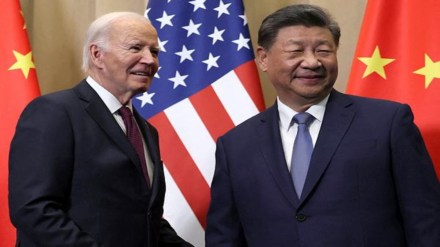Chinese President Xi Jinping met outgoing U.S. President Joe Biden for the last time on Saturday during the Asia-Pacific Economic Cooperation (APEC) summit in Lima, Peru. While reflecting on the current US-China relationship, Xi also looked ahead, emphasising Beijing’s readiness to engage with the incoming administration of President-elect Donald Trump.
“China is ready to work with a new US administration to maintain communication, expand cooperation, and manage differences,” Xi said. His remarks underscored a cautious optimism, albeit shadowed by concerns over Trump’s campaign rhetoric advocating “America First” policies, including protectionist trade measures.
Stability Between Superpowers: A Global Imperative
Xi highlighted the global significance of a stable US-China relationship, calling it critical not only to the two nations but also to the “future and destiny of humanity.” He urged Biden to “make a wise choice” and explore constructive ways for major powers to coexist, suggesting that mutual respect and cooperation are key to avoiding conflict.
Without mentioning Trump by name, Xi subtly conveyed concerns that the incoming administration’s approach could strain bilateral ties, particularly amid discussions of increased tariffs and supply chain shifts away from China by US companies.
Biden’s Reflections on US-China Relations
President Biden, in his final diplomatic engagement with Xi, spoke of their long-standing relationship, which began when both served as vice presidents. “We haven’t always agreed, but our conversations have always been candid and frank. These conversations prevent miscalculations and ensure competition doesn’t veer into conflict,” Biden said.
Acknowledging the ups and downs of the past four years, Biden stressed the importance of maintaining open communication channels and highlighted efforts to stabilise the relationship during his presidency.
“China’s goal of a stable, healthy, and sustainable China-US relationship remains unchanged,” Xi said. He emphasized Beijing’s commitment to maintaining communication, expanding cooperation, and managing differences as Trump’s presidency nears.
Biden acknowledged that while the two leaders had not always agreed, their conversations had been “frank” and “candid.” Biden’s national security adviser, Jake Sullivan, highlighted the importance of maintaining leader-to-leader talks even after Biden’s departure.
Major Issues on the Table
The meeting addressed numerous contentious topics, reflecting the complexity of US-China relations:
- Trade and Tariffs: Trump’s proposed 60 per cent tariffs on Chinese imports loom large, signalling potential trade tensions. Xi expressed opposition to protectionist measures, advocating for mutual cooperation.
- Cybersecurity: Biden raised concerns over a recent China-linked hack targeting US officials, while Xi dismissed accusations of Chinese involvement.
- Taiwan: The leaders clashed over Taiwan, with Biden urging an end to Beijing’s military activity near the island. Xi criticized Taiwanese President Lai Ching-te’s actions as incompatible with peace.
- South China Sea: Xi warned the US against involvement in disputes over the Spratly Islands, reiterating China’s rejection of an international tribunal’s 2016 ruling against its territorial claims.
- North Korea: Biden urged Xi to leverage China’s influence to prevent North Korea from escalating its support for Russia in the Ukraine conflict.
Human Rights and Detentions
Biden raised the issue of Americans detained in China, stressing the need for their release. Discussions also touched on broader human rights concerns, though no significant breakthroughs were reported.
Artificial Intelligence and Nuclear Weapons
The two leaders made a notable agreement on the role of artificial intelligence in military decision-making, affirming that humans, not AI, should control decisions regarding nuclear weapons. This marked a rare consensus amidst broader tensions. Xi voiced concerns over Biden’s restrictions on US investment in Chinese technologies like artificial intelligence, semiconductors, and quantum computing. While Biden has framed these measures as necessary for national security, Xi argued they hurt mutual economic interests.
China’s economy is also under pressure from a US-led global shift in supply chains. American companies like Nike and Steve Madden have announced plans to reduce reliance on Chinese manufacturing.
Transition Challenges and Trump’s Policy Signals
As Biden’s administration transitions power, uncertainty looms over how Trump’s presidency will shape US-China relations. Trump has proposed aggressive tariffs on Chinese imports and selected hawkish policymakers, signalling a potentially confrontational approach.
The Biden administration, meanwhile, is focused on ensuring a smooth handover. National Security Advisor Jake Sullivan noted that Biden reinforced the need for stability during the transition period, emphasising the importance of continuity in US-China engagement.
Latin America: A New Battleground
Xi’s visit to Peru included efforts to deepen ties in Latin America, a region long dominated by US influence. China’s plans, including a refurbished free-trade agreement with Peru and the inauguration of the massive Chancay deep-water port, signal its growing interest in the region’s resources and markets.
U.S. officials have expressed concerns that China may seek to establish military and intelligence footholds near U.S. borders. Chinese media dismissed these allegations as baseless.
Stability or Conflict?
Xi cautioned against viewing the US-China relationship as adversarial, warning that rivalry could “roil or even set back” ties between the two nations. Instead, he advocated for treating each other as partners to achieve “considerable progress.”
Biden, reflecting on their long-standing relationship, emphasised the importance of diplomacy in managing competition. Yet, the transition to Trump’s administration adds uncertainty, with hawkish advisors poised to shape a potentially confrontational U.S. policy.
Xi’s remarks, while directed at Biden, were unmistakably a message for Trump. His call for cooperation and rejection of protectionist policies reflects Beijing’s strategic priorities as it braces for potential challenges under the new US administration.
With North Korea’s provocations, cyber threats, and trade disputes on the table, the US-China relationship remains one of the most consequential and complex dynamics in global diplomacy. Whether the Trump administration adopts a cooperative or adversarial stance will significantly influence the trajectory of this critical bilateral relationship.
(With agency inputs)
W
